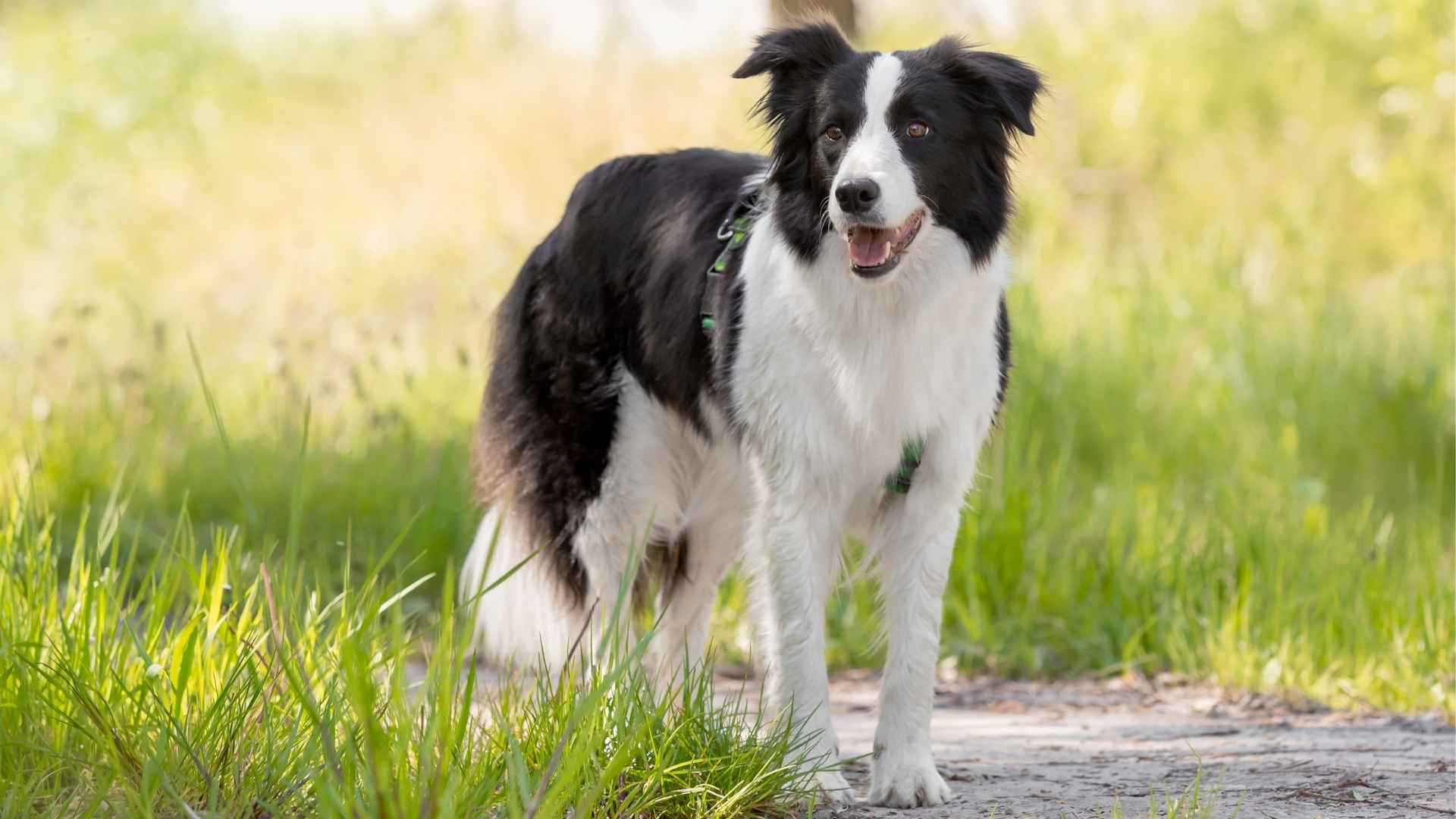Hiking with your dog is one of life’s greatest joys—after all, what’s better than exploring the great outdoors with your best furry friend by your side? But not all dogs are built for the hiking trails, especially if you’re looking for a low-maintenance hiking buddy who’s just as laid-back as they are adventurous.
Luckily, there are plenty of dog breeds that can keep up with your outdoor exploits without requiring too much extra care. These dogs are the perfect companions for long hikes, offering a balance of energy and ease that makes them ideal for those who love to hit the trails but don’t want to worry about grooming or constant upkeep.
So, if you’re ready to discover some low-maintenance hiking dog breeds that will gladly join you on every adventure, grab your leash, and let’s take a walk through some of the best trail-ready pups!
Low-maintenance Hiking Dog Breeds
1. Labrador Retriever
Labrador Retrievers are the perfect trail buddies—always sensible, even-tempered, and more than happy to walk for hours on end. With their love for outdoor adventures, they’re the ultimate hiking companions. Want a game of fetch along the way? You got it!
Originally bred as retrieving dogs for fishermen, Labs are incredibly athletic and versatile. Their strong build and love for physical activity make them fantastic hiking partners. Whether it’s climbing over rocks or crossing streams, they’re always up for the challenge—and a little splash on the way is just a bonus.
Their natural curiosity and friendly nature make them a joy to be around on the trail. With their ability to stay calm and collected in any situation, you’ll find that your Labrador is a great listener and a steady presence, whether you’re tackling tough terrain or just enjoying the views.
As noted by WebMD, Labs love carrying objects, so if there’s a game of fetch on your hike, they’ll be the first to volunteer. But their talents don’t end there—they also excel at activities like swimming, agility, and even dock diving. So, if your hiking trip includes some water fun or an impromptu game, your Lab will be right at home.
Labradors are also among the best family dogs out there. Their gentle and patient nature makes them fantastic companions for kids, and they tend to get along with just about everyone—human or animal. They’re social butterflies, always looking to please, and their intelligence makes them highly trainable.

Training your Lab is a breeze, especially when you offer plenty of rewards like treats, praise, and play. Early socialization helps them develop into confident, well-behaved dogs, and with consistent, positive training, they’ll be the perfect hiking buddy—obedient, adaptable, and always ready for the next adventure.
2. Border Collie
Border Collies are the brainiacs of the dog world—quick on their feet and even quicker to learn! Bred for herding, these pups thrive in active households where they can join in on the fun. If you’ve got a busy lifestyle and love outdoor adventures, a Border Collie is ready to jump in (literally) and keep up with your energy.
These dogs are highly social and enjoy the company of other dogs, and with the right introductions, they can even be pals with cats. But don’t be fooled by their friendly nature—they’re also an incredibly intelligent breed, which means they need mental stimulation to avoid getting bored (and potentially destructive).
Training a Border Collie is like working with a four-legged genius. They’re quick to pick up new tricks, especially with a little positive reinforcement and some tasty treats. Just be sure to work on recall before letting them off-leash, as their herding instincts can lead them to chase anything that moves. They may not always be the best at listening to other dogs, but with your guidance, they’ll be a star pupil!
Exercise is a must for these high-energy dogs. Border Collies love long walks, running, and anything that gets them moving. They make fantastic running buddies, so if you’re looking for a dog who’ll help you log those extra miles, look no further! Just don’t expect them to be couch potatoes—they need mental and physical challenges daily to stay happy.
With their intelligence comes a need for variety. A simple walk won’t cut it. Border Collies love activities like flyball (think relay races but with dogs), frisbee, swimming, and even dog sports like agility and obedience. Keep them engaged, and they’ll be your perfect outdoor partner. But skip the boredom, and you might find your shoes mysteriously disappearing!
In short, Border Collies are ideal for owners who can give them enough exercise and mental stimulation. If you’re up for the challenge, they’ll reward you with loyalty, fun, and maybe a few well-earned compliments for having the smartest dog in the park!
3. Jack Russell Terrier
Jack Russell Terriers are like little bundles of energy wrapped in fur! These pint-sized pooches are packed with boundless enthusiasm and a curiosity that could rival any detective. Whether it’s digging or chasing after critters, they need constant mental and physical stimulation to stay happy.
If they’re left to their own devices, don’t be surprised if they end up chewing on furniture or barking at absolutely everything—wind, leaves, squirrels… You name it!
So, how far can a Jack Russell hike? Well, that depends on a few things—like their age, size, and fitness level. A young, fit Jack Russell might be able to tackle a 10-mile hike, but older or less active ones might tire out faster. If your pup isn’t used to long walks, start slow and gradually increase the distance. After all, you don’t want your little explorer running out of steam halfway through the adventure!
Before you head out, there are a few things to keep in mind. First off, pack water—not just for you, but for your Jack Russell too! These little guys can get dehydrated on the trail, so keep them hydrated.
Also, Jack Russells aren’t built for cold weather, so if temperatures dip below 45°F, it’s probably best to leave them at home—or at least throw on a cozy winter coat.
As noted by Britannica, despite their small stature, Jack Russells are surprisingly agile and love outdoor activities, making them great hiking companions. Their energy levels are off the charts, and they love running, fetching, and sniffing out anything that moves.
Just be prepared for their high prey drive—if they spot a small animal during a hike, chasing it might be their first instinct. But with some training and supervision, you can help channel their energy into more productive (and less mischievous) outlets!
One thing to keep in mind!
Jack Russells have a tendency to run off if they catch sight of something interesting (like a squirrel or another dog). Keep your pup on a leash or harness to prevent any impromptu “escape artist” moments.
And if it’s their first hike, start with shorter, easier trails to build their stamina. With their playful spirit and love for adventure, a Jack Russell can make the perfect hiking buddy—just be ready for a lot of energy and even more fun!
4. Vizsla
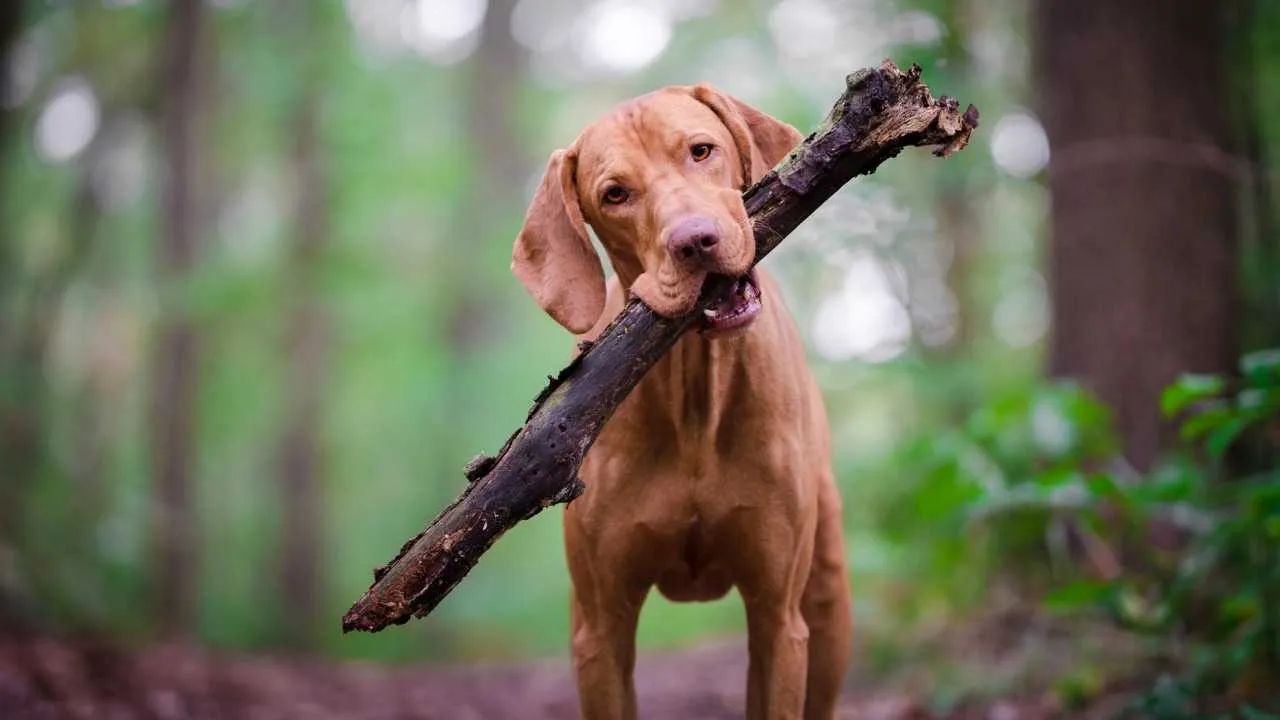
Vizslas are the ultimate “Velcro dogs”—they’ll stick to you like glue and will follow you everywhere! Known for their deep bond with their humans, they’re the perfect hiking buddies. These Hungarian hunting dogs are built for the outdoors and love a good run. So, whether you’re hitting the trails or going for a jog, these athletic dogs will be right there with you, tail-wagging and ready for action.
With their boundless energy, Vizslas need plenty of exercise to stay happy. If they don’t get it, you might find them chewing your furniture, barking at doors, or causing a bit of chaos around the house.
They thrive on daily adventures like hiking, swimming, or playing fetch. But don’t worry—they also love being a lap dog after a long day of outdoor fun, so you’ll get the best of both worlds: an energetic companion and a cuddle buddy.

Vizslas’ affectionate nature makes them great family dogs, especially with older kids who can keep up with their energy. They’re friendly and patient and love being involved in all family activities. But be warned, they do need early socialization and positive reinforcement training to prevent them from turning into little rebels.
These dogs are top-notch athletes with sleek, elegant builds and a love for being active. Whether it’s running, swimming, or playing flyball, Vizslas are always up for a challenge. They’re sensitive, so harsh commands won’t do.
A little patience, positive training, and loads of love will help them shine. Plus, their silky ears make them look both adorable and intense, depending on the situation!
Intelligence? Oh, they’ve got it in spades!
However, if you don’t keep them mentally stimulated, they might start using their brains for mischief. Vizslas are curious and will find ways to keep themselves entertained if you’re not providing enough activities. Thankfully, there are plenty of ways to engage them, like scent work, tracking, or agility training.
5. Dachshund
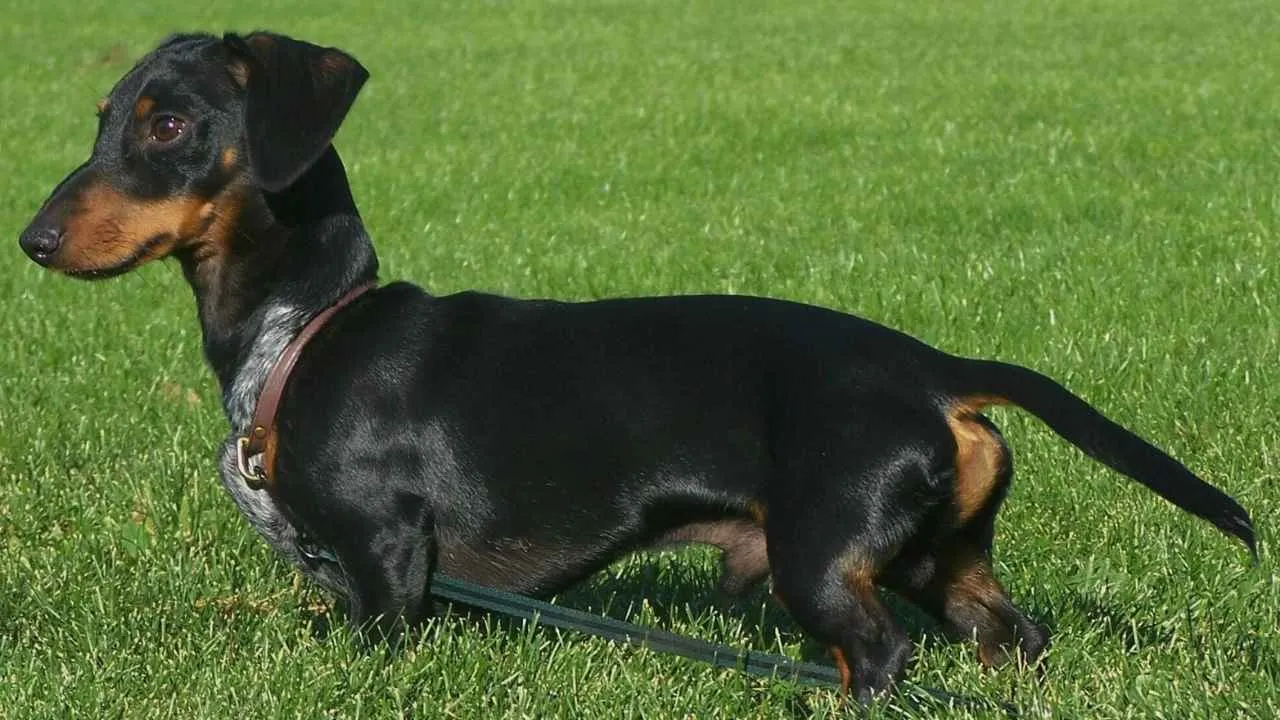
Dachshunds—aka “sausage dogs” or “Doxies”—may be small dogs, but they’re bursting with energy and personality. Originally bred in Germany to hunt badgers, this specific breed is fearless and determined.
With their long bodies, short legs, and expressive faces, they’re often underestimated—but these highly intelligent dogs are well-suited for adventure and companionship alike.
As noted by Britannica, Dachshunds come in three coat types: smooth, longhaired, and wirehaired. Smooth-coated Doxies require minimal grooming—just a quick brush to keep them tidy. Longhaired varieties need more regular grooming to prevent tangles, while wire-haired ones benefit from occasional hand-stripping for that rugged texture. Regardless of coat type, maintaining their fur is manageable with the right routine.
These dogs may have short legs, but they’re surprisingly capable on the trail. With regular exercise and the right motivation, they can tackle long distances and fun outdoor activities with ease. Many dogs love scent-tracking and exploring, and Doxies are no exception.
Their gentle personality makes them excellent cuddle companions after a day of physical exercise, though their bark often gives away their bold, protective nature.
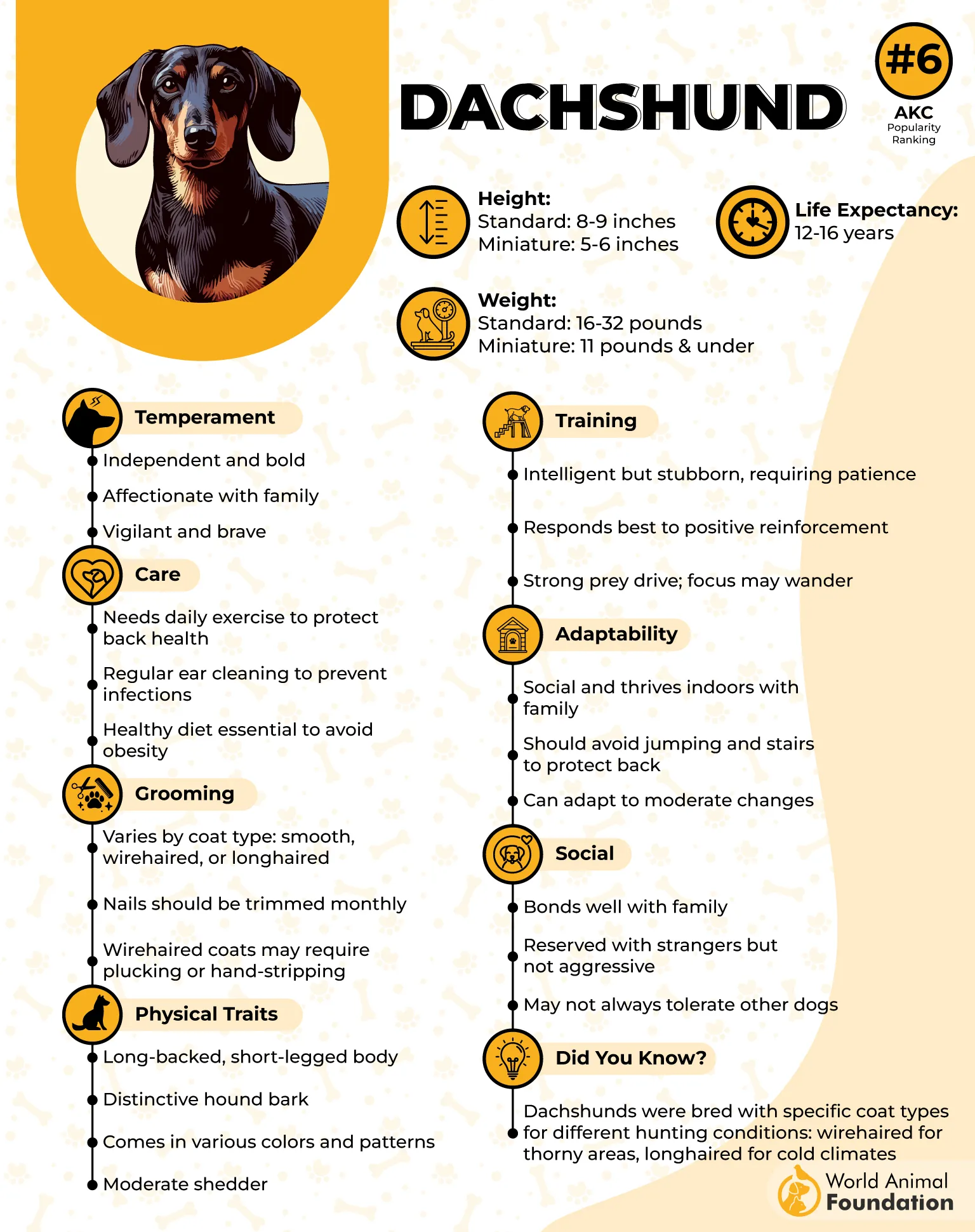
Dachshunds are known for being a bit stubborn and independent, traits that may challenge first-time dog owners. They’re often a better fit for more experienced owners who understand the importance of early training. They may not be traditional working dogs, but they’re loyal, adventurous, and make great trail partners.
Though compact, Dachshunds are generally healthy, but like many long-backed breeds, they can be prone to hip dysplasia and back issues. Keeping their weight in check and avoiding excessive jumping helps reduce the risk.
6. Beagle

Beagles are tiny but mighty—packed with energy, curiosity, and a nose that could track down a snack across miles of terrain. These little scent hounds are known for their adventurous spirit and love for following a trail, making them both fun and challenging hiking companions.
But, fair warning, they’ll likely be sniffing every tree and bush they pass, so a leash is often a good idea—unless you’re ready for an impromptu treasure hunt!
With their adorable floppy ears and perky demeanour, Beagles are definitely the social butterflies of the dog world. They’re friendly, loving, and eager to please, making them great companions for first-time dog owners. Beagles are also quite mischievous, so be prepared for a dog who’s always up to something fun (or a bit naughty).
These energetic little pups are surprisingly tough and make excellent hiking buddies—just not for those marathon 20-mile trails. A Beagle can handle about 10 miles of hiking in a day if they’re well-conditioned, and they’ll keep up with you on the shorter trails without breaking a sweat.
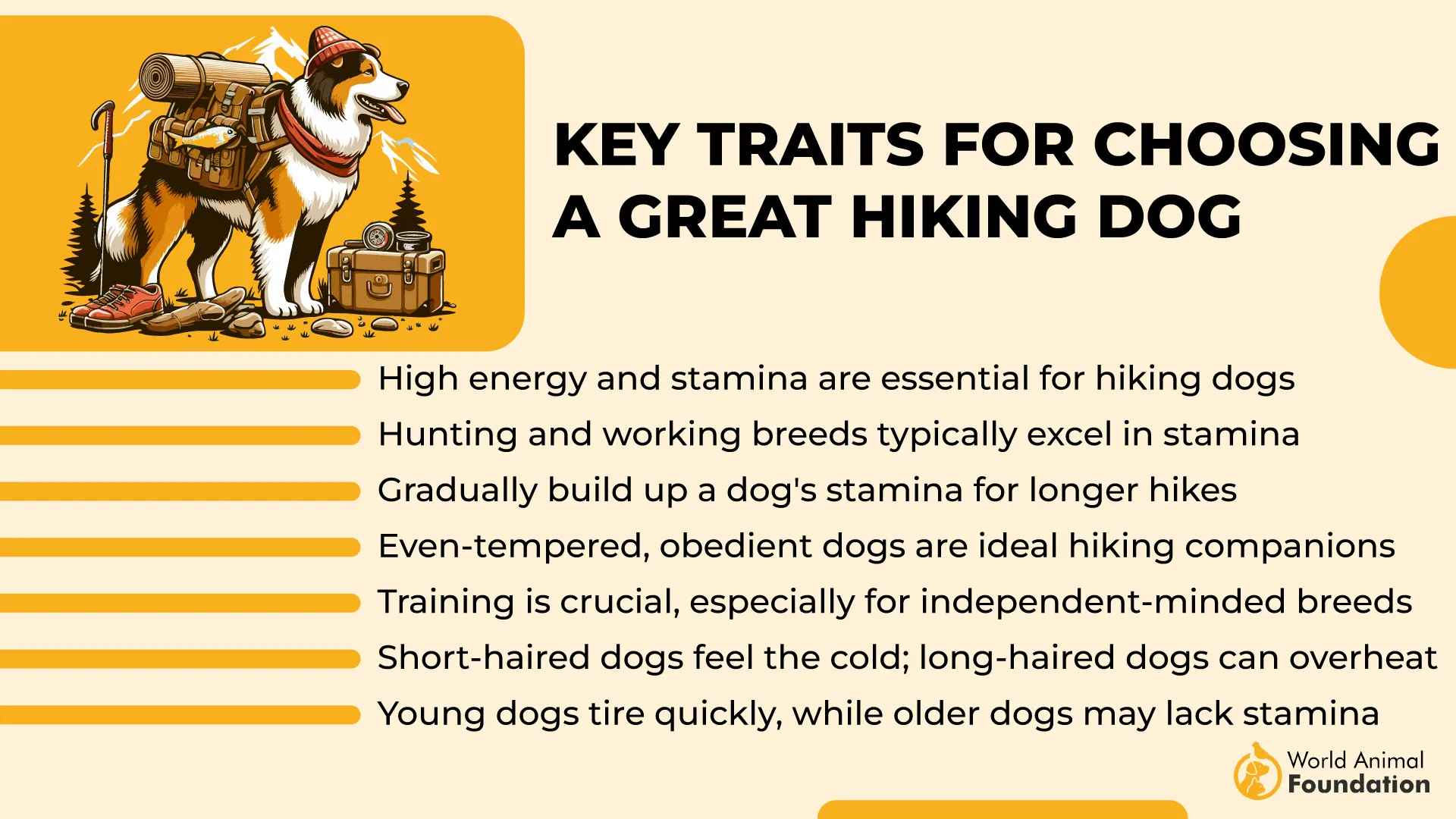
Here’s why Beagles are great for hiking (with a few caveats)
Energetic & Enduring: These dogs have lots of stamina and will happily keep up on shorter hikes.
Amazing Sense of Smell: A Beagle’s nose is their superpower, but it can also be a challenge—they’ll often want to chase other animals and whatever catches their scent.
Leash Supervision: Due to their hunting instincts, they’ll need a leash to keep them from chasing after every bunny they sniff out.
While they’re tough little adventurers, the Beagles do need regular training, especially on the trail. The classic “leave it” command is a must for keeping them focused on the hike rather than whatever’s tempting their nose. With some patience and preparation, your Beagle can become a trusty (and super cute) hiking partner.
7. Rhodesian Ridgeback
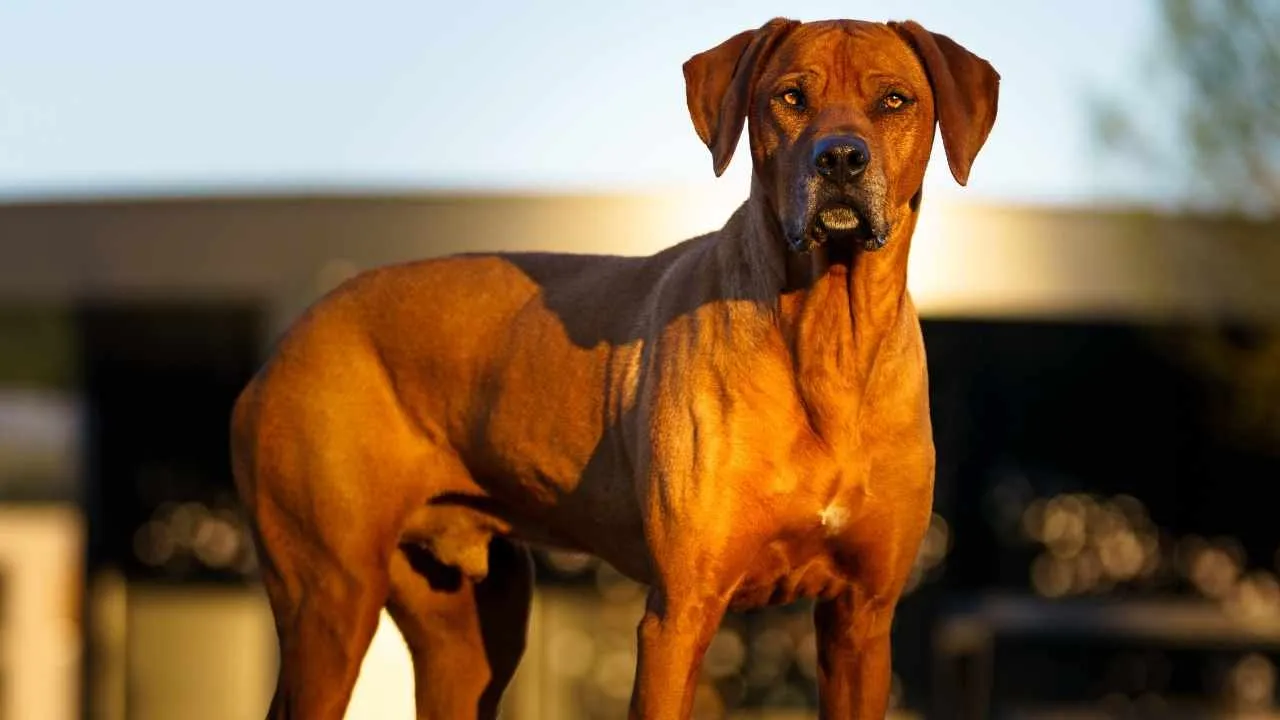
The Rhodesian Ridgeback is a serious powerhouse with a soft side—this dog is all muscle, but also packs a big heart for its family. Known for the distinct “ridge” of hair running down its back (yes, it grows backward!), this breed is a mix of elegance and strength, making it a great fit for families with active lifestyles.
Don’t let their intimidating name, African Lion Hound, fool you—they’re also loyal, loving, and known for being a bit reserved around strangers.
AKC states that at a solid 70–85 pounds and standing 24–27 inches at the shoulder, Ridgebacks are no lap dogs. They’re built like athletes, with a strong, muscular frame that screams, “Let’s go for a run!” These dogs were originally bred to hunt big game, including lions, so it’s no surprise that they have energy and stamina to spare.
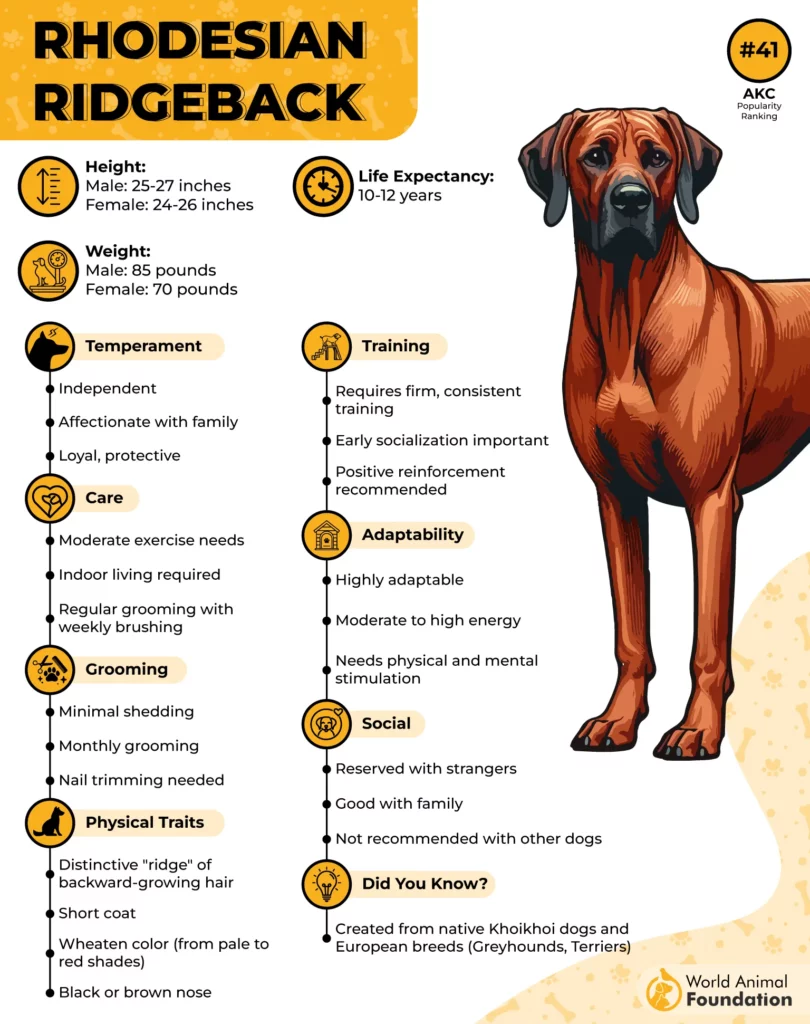
If you’re imagining a calm couch potato dog, think again. Rhodesian Ridgebacks need daily exercise and mental stimulation to stay happy. They’re not the kind of dog who’s content with a quick walk around the block.
Here’s what makes the Ridgeback an ideal fit for an active family
Endurance: These dogs were bred for long hunts across vast African landscapes, so they can handle anything from six-mile runs to 10-mile hikes. They can keep pace with a running horse—yes, really!
Fearless Hiking Companion: A Ridgeback is not just about looks—they’ve got the stamina and protective instincts to be a fantastic hiking partner. They’ll stick with you on the trail and keep an eye out for any potential danger.
Mental Stimulation Needed: Like any good athlete, a Rhodesian Ridgeback needs more than just physical activity. They thrive on mental challenges, so puzzle toys and problem-solving games are a must to avoid boredom.
With their strong-willed nature, Ridgebacks do best with families who can provide proper training, plenty of exercise, and a lot of affection. They’re incredibly loyal to their families but can be a bit aloof with strangers, so socialization from puppyhood is key.
Conclusion
If you love dogs, live for the great outdoors, and don’t want to spend hours grooming after every hike, best dog breeds for hiking are your trail-tested soulmates. From the adventure-ready German Shorthaired Pointer to the ever-energetic Blue Heeler, these pups are built to keep up without needing a doggy spa day after every outing.
Other breeds with thick double coats like the Siberian Husky, Alaskan Malamute, or Bernese Mountain Dog might look high-maintenance, but they’re surprisingly self-sufficient in cold and wet conditions. And if you’re trekking under the sun, short-haired dogs like the German Shorthaired Pointer strike the perfect balance between endurance and easy upkeep.
Whether you’re working outdoors, logging long hours on the trail, or just trying to keep a healthy lifestyle with your big dog buddy, most dogs on this list are ready to roll. Just be sure to match your dog’s exercise needs with your own pace, and always choose a reputable breeder if you’re adding a new trailmate to the pack.
Because when you’ve got a low-fuss, high-energy hiking partner like an Australian Shepherd or Golden Retriever by your side, adventure (and a bit of fur) is never far behind!


